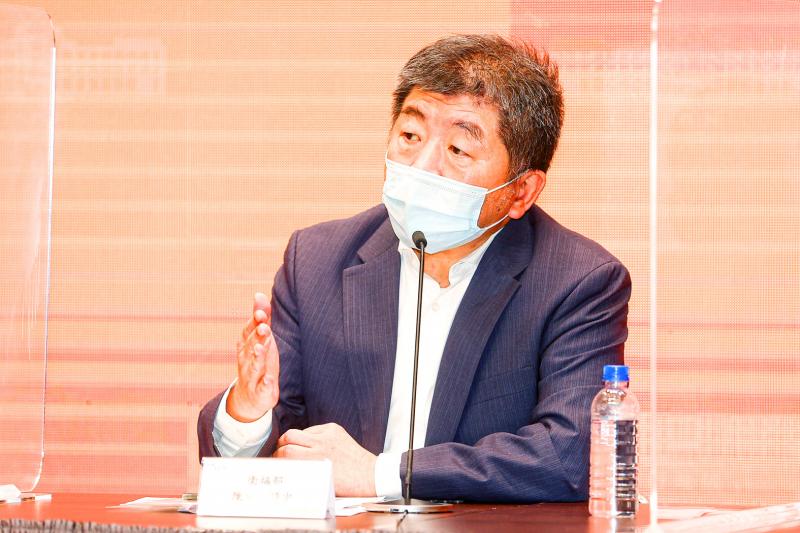Minister of Health and Welfare Chen Shih-chung (陳時中) yesterday announced his resignation, saying that he was standing down to focus on his Taipei mayoral campaign ahead of the Nov. 26 election.
Chen, who on Wednesday was selected as the Democratic Progressive Party’s (DPP) candidate, told a Cabinet news conference in Taipei that he had submitted his letter of resignation to Premier Su Tseng-chang (蘇貞昌) yesterday morning.
Chen said that he would stay on as health minister until a successor is named, adding that he would also resign from his duties as head of the Central Epidemic Command Center (CECC).

Photo: CNA
Chen, who became health minister in 2017, rose to prominence as the face of the government’s response to the COVID-19 pandemic, hosting the center’s daily news briefings.
The center had worked tirelessly to fight COVID-19 over the past two years, Chen said, adding that he was confident his replacement would lead the team with similar vigor.
Executive Yuan spokesman Lo Ping-cheng (羅秉成) said that the Cabinet would announce Chen’s replacement as soon as a decision is made.
Anonymous Cabinet sources on Wednesday said that the government was expected to name Chen’s replacement in one week.
Chen, 68, was a dentist before being appointed deputy minister of the then-Department of Health in 2005.
He has never run for government office, but his central role in leading the nation’s COVID-19 response has transformed him into a hopeful to lead the capital.
Chen’s entry into the Taipei mayoral race has been heavily criticized by opposition parties such as the Chinese Nationalist Party (KMT), which said that Chen would be abandoning his post while the nation continues to deal with COVID-19.
In the mayoral race, Chen is to face KMT Legislator Chiang Wan-an (蔣萬安), and possibly Deputy Taipei Mayor Vivian Huang (黃珊珊), who has yet to announce her election bid, as a candidate for the Taiwan People’s Party.

The Ministry of Education (MOE) is to launch a new program to encourage international students to stay in Taiwan and explore job opportunities here after graduation, Deputy Minister of Education Yeh Ping-cheng (葉丙成) said on Friday. The government would provide full scholarships for international students to further their studies for two years in Taiwan, so those who want to pursue a master’s degree can consider applying for the program, he said. The fields included are science, technology, engineering, mathematics, semiconductors and finance, Yeh added. The program, called “Intense 2+2,” would also assist international students who completed the two years of further studies in

The brilliant blue waters, thick foliage and bucolic atmosphere on this seemingly idyllic archipelago deep in the Pacific Ocean belie the key role it now plays in a titanic geopolitical struggle. Palau is again on the front line as China, and the US and its allies prepare their forces in an intensifying contest for control over the Asia-Pacific region. The democratic nation of just 17,000 people hosts US-controlled airstrips and soon-to-be-completed radar installations that the US military describes as “critical” to monitoring vast swathes of water and airspace. It is also a key piece of the second island chain, a string of

Former president Tsai Ing-wen (蔡英文) departed for Europe on Friday night, with planned stops in Lithuania and Denmark. Tsai arrived at Taiwan Taoyuan International Airport on Friday night, but did not speak to reporters before departing. Tsai wrote on social media later that the purpose of the trip was to reaffirm the commitment of Taiwanese to working with democratic allies to promote regional security and stability, upholding freedom and democracy, and defending their homeland. She also expressed hope that through joint efforts, Taiwan and Europe would continue to be partners building up economic resilience on the global stage. The former president was to first

Taiwan will now have four additional national holidays after the Legislative Yuan passed an amendment today, which also made Labor Day a national holiday for all sectors. The Chinese Nationalist Party (KMT) and Taiwan People’s Party (TPP) used their majority in the Legislative Yuan to pass the amendment to the Act on Implementing Memorial Days and State Holidays (紀念日及節日實施辦法), which the parties jointly proposed, in its third and final reading today. The legislature passed the bill to amend the act, which is currently enforced administratively, raising it to the legal level. The new legislation recognizes Confucius’ birthday on Sept. 28, the